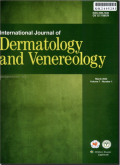NCSTN Gene Silencing Inhibits the Retinoic Acid Signaling Pathway in Human Immortalized Keratinocytes
Objective::Acne inversa is a multifactorial chronic debilitating disease. Genetic factors are involved in 40% of patients, especially the nicastrin (
NCSTN) gene. However, the role of the mutated
NCSTN gene in the pathogenesis of acne inversa remains unclear. Retinoic acid is recommends to treat moderate to severe acne inversa, therefor we conduct this
in vitro research to study the association between
NCSTN gene mutation and the retinoic acid signaling pathway in human immortalized skin keratinocyte (HaCaT) cells.
Methods::HaCaT cells were infected with a lentivirus-mediated short hairpin RNA (shRNA) expression plasmid specifically targeting the
NCSTN gene. Real-time polymerase chain reaction (PCR) and Western blotting were used to detect the interference efficiency of NCSTN. RNA sequencing was used to detect differential genes in the
NSCTN-deficient HaCaT cells. Based on bioinformatics analysis and clinical treatment data, the retinoic acid signal pathway was selected for screening. Quantitative PCR was used to verify the changes in the expressions of retinoic acid signaling pathway-related receptors and molecules in the HaCaT cell line after
NCSTN silencing. The Student t test and one-way analysis of variance were used to evaluate intergroup differences.
Results::Sequencing showed that the
NCSTN-shRNA lentiviral recombinant expression plasmid was successfully constructed. After lentivirus infection of HaCaT cells, real-time PCR results showed significantly reduced
NCSTN mRNA expression in the interference group compared with the negative control group, and the interference efficiency was 75.0%. Western blotting showed that the inhibition rate of
NCSTN protein expression in the shRNA group was 71.7%. RNA sequencing revealed significant differential expression of some genes, and changes in signaling pathways. Compared with the control group, the group with the silenced
NCSTN showed significantly decreased expression of retinoic acid receptors (RARα: F=23.482, RARβ: F=603.241, RXRα: F=69.689, and RARRES1: F=167.482, and all
P < 0.001), and peroxisome proliferator-activated receptor γ (F=8.138,
P < 0.01).
Conclusion::Defective function of the
NCSTN gene leads to an impaired retinoic acid signaling pathway in HaCaT cells, which suggests that the retinoic acid signaling pathway may play a role on the onset of acne inversa caused by
NCSTN gene mutation.
acne inversa、NCSTN gene 、retinoic acid signaling pathway
04
This study was funded by the National Natural Science Foundation of ChinaNo. 81472872;the CAMS Innovation Fund for Medical SciencesNo. 2016-I2M-1-002;the Central Universities Fundamental Research Funds in PUMCNo. 3332019160
2023-05-30(万方平台首次上网日期,不代表论文的发表时间)
共6页
26-31






